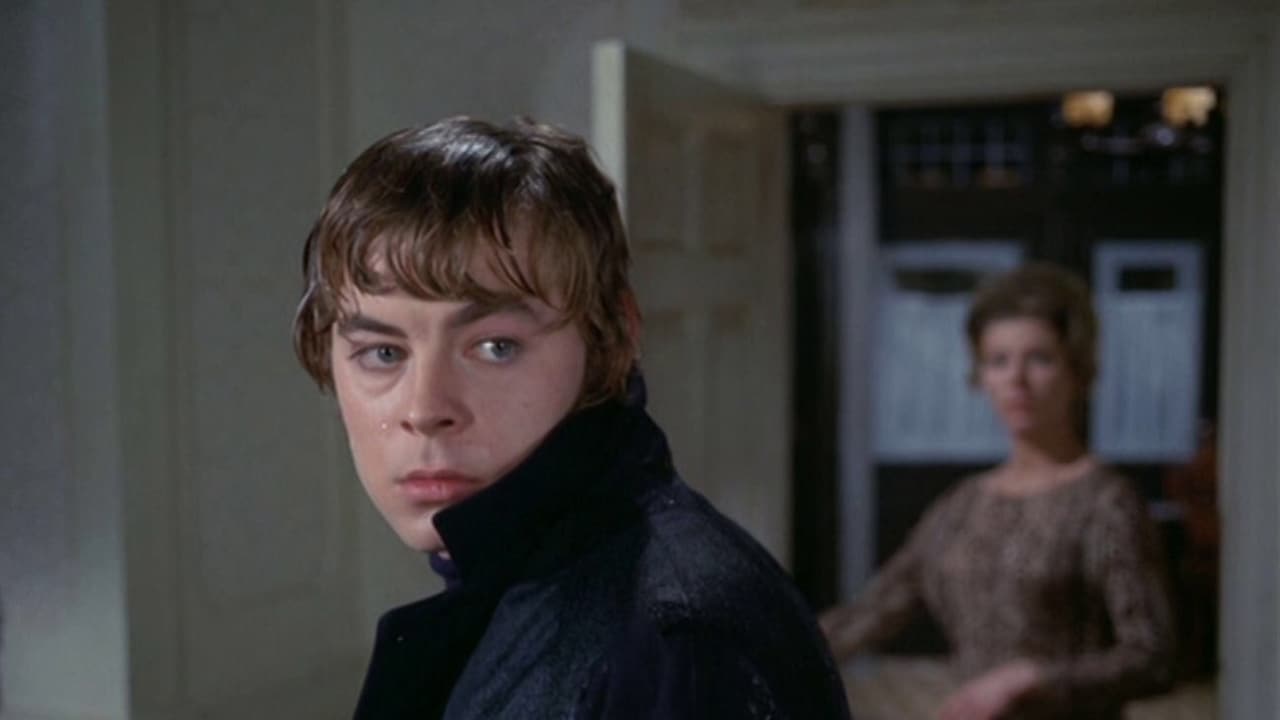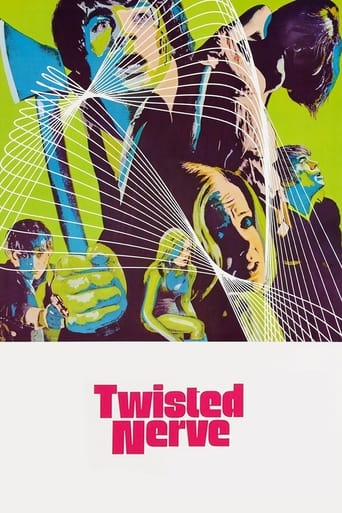

Late '60s British psychological thriller Twisted Nerve makes a rather insensitive connection between mongolism (Down's Syndrome) and psychopathic tendencies, which may be upsetting for some viewers (the film ran into trouble on its original release for just that reason); however, political incorrectness aside, this is a very entertaining movie—a deftly directed, well acted study of a dangerous character who is completely unable to understand, feel or function like a normal human being.A young Hywel Bennett plays 22-year-old Martin Durnley, brother to a mongol, whom he regularly visits at a care home. Stopping off at a store on the way home, Martin spies lovely librarian Susan (Hayley Mills) in the toy department, and employs a rather unorthodox strategy to make her acquaintance: he involves her in a case of shoplifting, subsequently pretending to be mentally retarded to excuse his actions. Calling himself Georgie, he proceeds to concoct an elaborate ruse to worm his way into Susan's life, eventually taking up residency in the guest house she shares with her mother Joan (Billie Whitelaw), and lodgers Shashie Kadir (Salmaan Peerzada) and Gerry Henderson (Barry Foster).As well as providing an excuse to get close to Susan, Martin's deception enables him to be rid of his domineering and disapproving stepfather Henry (Frank Finlay): one night, when 'Georgie' is supposedly tucked up in bed, Martin sneaks out of the guest house and murders Henry, returning back before anyone can notice his absence; however, there's no such thing as the perfect crime, and circumstances lead Susan to suspect that Georgie isn't quite the innocent simpleton he seems to be, putting herself (and her mother) in mortal danger.Although it is Mills who is arguably the 'star' of Twisted Nerve, it is Bennett who impresses the most, putting in a thoroughly chilling and utterly convincing performance throughout, both as Machiavellian Martin and gormless Georgie (the ease with which he switches between personas is superb). Billie Whitelaw also puts in a very strong turn, adding a further level of complexity to the story with her troubled character, who finds herself drawn to Georgie like a moth to a flame (or like a sexually-frustrated, middle-aged woman to an axe). Director Roy Boulting handles the tension brilliantly, with one scene involving a plate of biscuits almost worthy of Hitchcock himself.The Hitchcock connection continues with a haunting Bernard Herrmann score (that will be familiar to fans of Kill Bill) and a Psycho-style ending that sees Martin shooting at his reflection in a mirror, effectively killing off that part of his personality, leaving only Georgie remaining. Like Norman Bates, he is last seen in a prison cell, a psychological mess repeatedly calling out for Susan.
... View MoreInteresting period film in terms of its attitude to mental illness,its fashions and London. Despite what some reviews state it doesn't link Downs Syndrome to the violence or sexual behaviours - in fact it states the opposite in the film. Much more a study of a decent into mental illness. Bennett is extraordinarily good in this film, he never acted so well. Not only because of the two parts to his character but because of the slow deterioration in one and the credible public and different private persona portrayed in the 'bad' one.Billie Whitelaw grows in stature and shows her subtle skills, and Haley Mills also performs well, still the 'nice girl' but no longer sugar sweet, she smokes, dates, flirts and Barry Foster also plays his minor part well. Enjoyable - catch it if you can.
... View MoreTwisted Nerve, something of a linking film between Michael Powell's Peeping Tom and Hitchcock's Frenzy, has floated about like a sick ghost for so long it's somehow managed to permeate the most seemingly unconnected crannies of pop culture.Singing tea cosy Badly Drawn Boy aka Damon Gough named his record label after the film, and more recently, its main theme, a haunting melody penned by legendary Hitchcock scorer Bernard Herrmann, was half-inched by Hollywood's pet magpie for his Kill Bill, Vol 1. Penned by celebrated Peeping Tom scribe Leo Marks, Twisted Nerve, a fairly typical late-1960s psycho-thriller in The Collector mould, stars Hywel Bennett as Martin Durnley, a rich but damaged Oxford University drop-out with a mutual hatred of his banker stepfather, played by Frank Finlay. However, his pathetic mum babies the boy, a consequence of Martin's elder brother, a Down Syndrome sufferer (or 'Mongoloid' - or even 'mentally backward' as they say here), being in full-time care, and the doctors having warned Martin's parents not to have any more children - just to be on the safe side. Too late: troubled mummy's boy Martin, with his cuddly toys and penchant for smashing his own reflection, appears to have proved the doctors misgivings.Kicked out of his family home by Finlay, Martin adopts a childlike alter-ego named 'Georgie' in order to ingratiate his way into the affections and boarding house of pretty librarian Susan Harper (Mills, keen to shrug off her child star image, but about as sexy here as a sliver of ivory soap) and her saucy mum Joan (Whitelaw). Safely ensconced in the family boarding house and claiming his father's away on business, Bennett takes this opportunity to visit his stepdad with a pair of scissors in the dead of night. Mrs Harper is next done in with an axe, and Susan is cornered at home, until Timothy West's Superintendent. Dakin breaks down the door to save the day. Marks' fingerprints are all over this one: the initial resemblance to Peeping Tom is striking. Both films feature quiet, isolated psychopaths who hate their fathers; both Peeping Tom's Mark and Twisted Nerve's Martin end up at a boarding house, encountering young girls with absent fathers who live with their mothers. But Twisted Nerve has never enjoyed the critical reappraisal and patronage latterly afforded Marks' earlier work. Other than Herrmann's superb score - and the fact it's been out of circulation for years - it's easy to see why Twisted Nerve has acquired such a cult status; and it's mostly down to sheer hubris. The Boultings made their name producing and directing respectable fare like The Magic Box, Brighton Rock and 1966's The Family Way (also starring Mills and Bennett) before chancing their arm at the exploitation bazaar. Yet this film is the equivalent of piling an away-day coach with some of the most respected actors, composers, directors, cinematographers and screenwriters in the business, stalling it beside the cliff edge at Beachy Head - and gunning the accelerator.Twisted Nerve summoned up a storm the likes of which glutton-for-punishment Marks had encountered before, during the furore over Powell's bedevilled masterpiece. For it implies (quite sneakily, as it happens) that otherwise healthy siblings of Down Syndrome sufferers (and here's the sneaky bit - 'or indeed anybody, Down Syndrome sufferers siblings included'), may, repeat may, due to "some error in the chromosome structure," also be prone to hereditary mental abnormality. Such as homicidal mania.Cue howls of protest from disability rights groups while the film was still in post-production, prompting a hastily tacked-on narrated disclaimer: "Ladies and gentlemen, because of the controversy already aroused, the producers of this film wish to re-emphasise what is already stated in the film, that there is no established scientific connection between Mongolism and psychotic or criminal behaviour."Well, as Whitlelaw's cheeky lodger Gerry (future Van Der Valk Barry Foster) would doubtless scoff, "What a load of sphericals!" When your movie mischievously plays fast and loose with scientific orthodoxy for exploitation purposes, plus the film's oh-so subtle (if factually inaccurate) tagline is: 'Cleaver. Cleaver. Chop. Chop. First the mom and then the pop. Then we'll get the pretty girl. We'll get her right between the curl,' you can hardly object when you're summarily hauled before the twin arbiters of political correctness and good taste. Aside from that little matter, Twisted Nerve is overlong, sloppy and tasteless - and those are just its good points. Given the era in which it was produced, it also lends voice to the most lively sexism and racism - mostly from cheeky chimp Barry Foster, all at the same time. If Marks' darkly satirical aim was to highlight bigotry in all its manifestations - and wrong-footed attitudes towards disability in particular - he surely succeeded, but nevertheless was playing a muddled, dangerous game. In fact, the real winner of Twisted Nerve was undoubtedly the Master himself, poaching both Whitelaw and Foster (who practically reprises his role) for 1972's Frenzy, an infinitely more accomplished, tauter psycho-killer thriller.That said, Bennett is excellent as the gleefully deranged Martin, while Whitelaw even won a 1969 BAFTA for Best Supporting Actress. And Twisted Nerve is often very funny. Witness Timothy West's admonishment of his forensics expert Clifford Cox: "They buy you a half million pound lab and stick you in it with a bunch of birds wearing skirts just long enough to cover their parking meters. And what do you come up with? No more than my nipper could have told me the day he was old enough to raise his truncheon." Roy Boulting certainly raised his where his leading actress was concerned: 33 years her senior, and already a veteran of three marriages, he wedded Mills in 1973, siring Crispian Mills, who with Kula Shaker ended up eulogising the swastika and dishing up the most unwanted Anglo-Asian fare since Spike Milligan's 'Curry And Chips'.
... View MoreThis is very dated and very much of its time (a capsule of the 'swinging sixties). Strangely set bound (even the exterior scenes are filmed on a set), it has the appearance / atmosphere of a stage play. For such a distinguished cast, there are more than a few shaky performances which makes the direction suspect. Not particularly enjoyable as a thriller, certainly not scary and why the DVD still carries an 18 certificate in the Uk heaven only knows. On any night of the week you can watch more explicit material than this on the main TV channels. Only worth watching as a curiosity now I'm afraid. One thing's for sure, Hywel Bennett would certainly have been better keeping his clothes on in the film, his pasty body isn't a pretty sight!
... View More